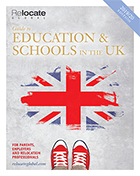How will the 2019 cohort of GCSE students fare?
Predictions for this year's GCSE results reveal mixed fortunes, with a slight increase in uptake, but criticism of the tougher exams. So what can we expect from the 2019 GCSE results?

Relocate's Guide to Education & Schools in the UK 2019/20 edition is out now!
The Guide is packed with expert tips for those who are relocating and the professionals who support them. Read articles from the guide below or access your digital copy here.
Nansi Ellis, assistant general secretary for policy at the NEU, said: “Hasty implementation of the new GCSEs and A-levels, with changes to content, the level of difficulty and grading, have caused huge difficulties for students and staff and put them under excessive pressure.”
Will girls take the most top GCSE grades?
Following the trend of last week's A Level results, experts predict that girls will get more top GCSE grades than boys. However, they believe that fewer than 2,000 candidates will achieve the highest mark of grade 9 across the board of eight subjects.According to provisional data from the exam regulator Ofqual, the overall GCSE entry for 2019 has increased slightly by just under one per cent to 5,185,840 pupils since last year. The increase is credited to an almost four per cent rise in entries of English Baccalaureate (EBacc) subjects – particularly Maths, English Language and Combined Science. Subjects that have seen the largest proportional increase are Computing, History and Spanish. Modern Foreign Languages is showing a positive trend; with French (around four per cent) and Spanish (ten per cent) increasing, while German entries dropped by two-and-a-half per cent.While this is promising news for these subjects, entries in non-EBacc subjects have decreased by nine per cent. The take-up of subjects such as Art, Music and Drama has been in decline since 2010, when the Department of Education launched the EBacc to incentivise schools and colleges to focus on core subjects. Design & Technology has the largest predicted decline at -23 per cent, with Drama at only minus-one per cent and Music at minus-three per cent. However, Art & Design is bucking the trend, with a 9 per cent rise to 184,060 pupils taking the GCSE in 2019, which is the largest number since 2012.Other non-EBacc subjects that have seen a decline between 2014 and 2019 include Media Studies (-40 per cent), Religious Studies (-30 per cent) and Physical Education (-25 per cent). While Business Studies is predicted to increase by just under five per cent.Positive predictions for STEM – but more planning is required
STEM subjects – Science, Technology, Engineering and Mathematics – have been firmly on the radar and the National Audit Office (NAO) has estimated that around £990 million has been spent on improving STEM skills for teaching staff and pupils between 2007 and 2017.Its latest report, the NAO has found that a number of initiatives aimed at boosting take-up and provision of STEM education have had a positive impact, and participation levels have grown in most areas of the STEM skills pipeline.However, the Amyas Morse, head of the NAO, warns that “there is an urgent need for the Department for Education and the Department for Business, Energy & Industrial Strategy to coordinate plans and set out what they are trying to achieve. A more precise understanding of the challenge would allow the Departments to better target and prioritise their efforts to deliver the STEM skills the economy needs.”More information on GCSE results
- GCSEs explained: examining the changes
- The education system in England
- GCSE results 2018: still on an upward trend
Following the news last week of an increase in pupils taking science subjects at A Level (a 26.2% rise in both boys and girls since 2010), it is likely that this increase will translate to GCSEs, with Ofqual predicting modest increases in Biology, Chemistry and Physics, and a higher increase in Combined Science.Secretary of State for Education, Gavin Williamson, commented, “I’m delighted to see more pupils choosing science-related subjects. This is encouraging particularly as we look to boost science in this country and the skills we’ll need in the future.”
Cambridge IGCSE exam entries show promising growth
Thousands of students around the world have already collected their IGCSE exam results, which were released on 13th August. Cambridge International (CI) has reported that IGCSE exam entries have risen by four per cent, while the number of schools now teaching CI programmes and the number of students taking Cambridge exams have both grown by six per cent internationally this year. The most popular Cambridge IGCSE subjects are Maths, Physics and First Language English.Christine Özden, chief executive officer for Cambridge International, said, “This year has been another great year for Cambridge International and our schools. We have seen growth in entries across all of our qualifications. I am particularly pleased to see so many new schools joining us this year and now able to offer our wide variety of qualifications and syllabuses across the Cambridge Pathway to their students.”Watch our short video to find out more about our Guide to Education & Schools in the UK:For the latest education news, articles and practical advice, see our Education & Schools section.The Relocate Guide to Education & Schools in the UK is a helpful tool for any family trying to negotiate the UK school system. It covers State, independent and international schools and helps you explore your options or to aid an employee who is trying to determine theirs. You can access it here.Don't miss out on advertising in our Guide to International Education & Schools 2019/20 edition – out September! For volume options, co-branded editions, digital or online licence agreements and advertising opportunities, call the office on +44 (0)1892 891334 or email education@relocatemagazine.com
©2025 Re:locate magazine, published by Profile Locations, Spray Hill, Hastings Road, Lamberhurst, Kent TN3 8JB. All rights reserved. This publication (or any part thereof) may not be reproduced in any form without the prior written permission of Profile Locations. Profile Locations accepts no liability for the accuracy of the contents or any opinions expressed herein.







































